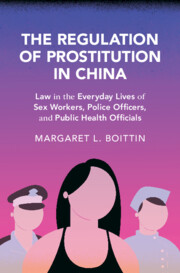 The Regulation of Prostitution in China
The Regulation of Prostitution in China Book contents
- The Regulation of Prostitution in China
- Cambridge Studies in Law and Society
- The Regulation of Prostitution in China
- Copyright page
- Dedication
- Contents
- Acknowledgments
- 1 Introduction
- Part I History, Contemporary Context, and Official Policies
- Part II Society
- Part III The State
- 8 Patterns of Punishment
- 9 The Weak Yet Savvy Street-Level Police Officer
- 10 China’s Sex Worker Health Policies: The Influence of Transnational Actors and Their Limitations
- 11 Street-Level Health Officials
- 12 Conclusion
- Book part
- Bibliography
- Index
- Cambridge Studies in Law and Society
9 - The Weak Yet Savvy Street-Level Police Officer
from Part III - The State
Published online by Cambridge University Press: 05 December 2024
- The Regulation of Prostitution in China
- Cambridge Studies in Law and Society
- The Regulation of Prostitution in China
- Copyright page
- Dedication
- Contents
- Acknowledgments
- 1 Introduction
- Part I History, Contemporary Context, and Official Policies
- Part II Society
- Part III The State
- 8 Patterns of Punishment
- 9 The Weak Yet Savvy Street-Level Police Officer
- 10 China’s Sex Worker Health Policies: The Influence of Transnational Actors and Their Limitations
- 11 Street-Level Health Officials
- 12 Conclusion
- Book part
- Bibliography
- Index
- Cambridge Studies in Law and Society
Summary
This chapter is about how police officers engage with sex workers when they are not enforcing anti-prostitution laws against them. By focusing their enforcement efforts on low-tier sex workers, the police help create a space for the middle tier of China’s sex industry – entertainment venues and their hostesses—to thrive. I find that law enforcement officers engage actively and in myriad ways with the sex industry when they are not focused on arresting sex workers. Some of their actions are purely extractive interactions. Yet other police behavior, while still self-serving, also benefits sex workers. Making sense of police actions in this context requires shifting our framework from exclusively viewing police as powerful figures in relation to sex workers to also viewing them as street-level bureaucrats who are accountable to the local government and the vast police bureaucracy of which they are at the forefront. This approach provides a different perspective on police officers, underscoring their weakness within China’s bureaucratic system rather than their strength in relation to the sex workers. Their vulnerability vis-à-vis the state even affects how they engage with sex workers and underscores conditions under which the job security of frontline police officers in fact depends on a cooperative local sex industry.
Keywords
- Type
- Chapter
- Information
- The Regulation of Prostitution in ChinaLaw in the Everyday Lives of Sex Workers, Police Officers, and Public Health Officials, pp. 239 - 255Publisher: Cambridge University PressPrint publication year: 2024
